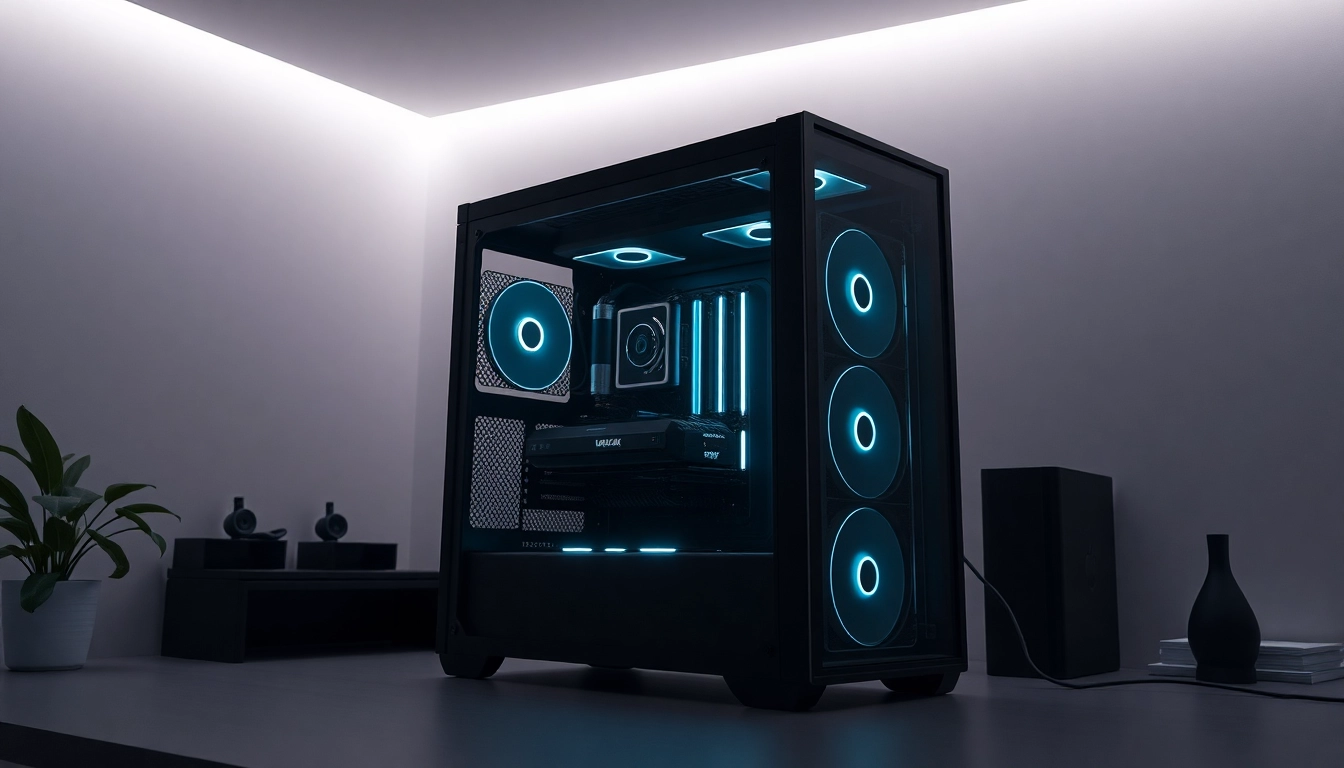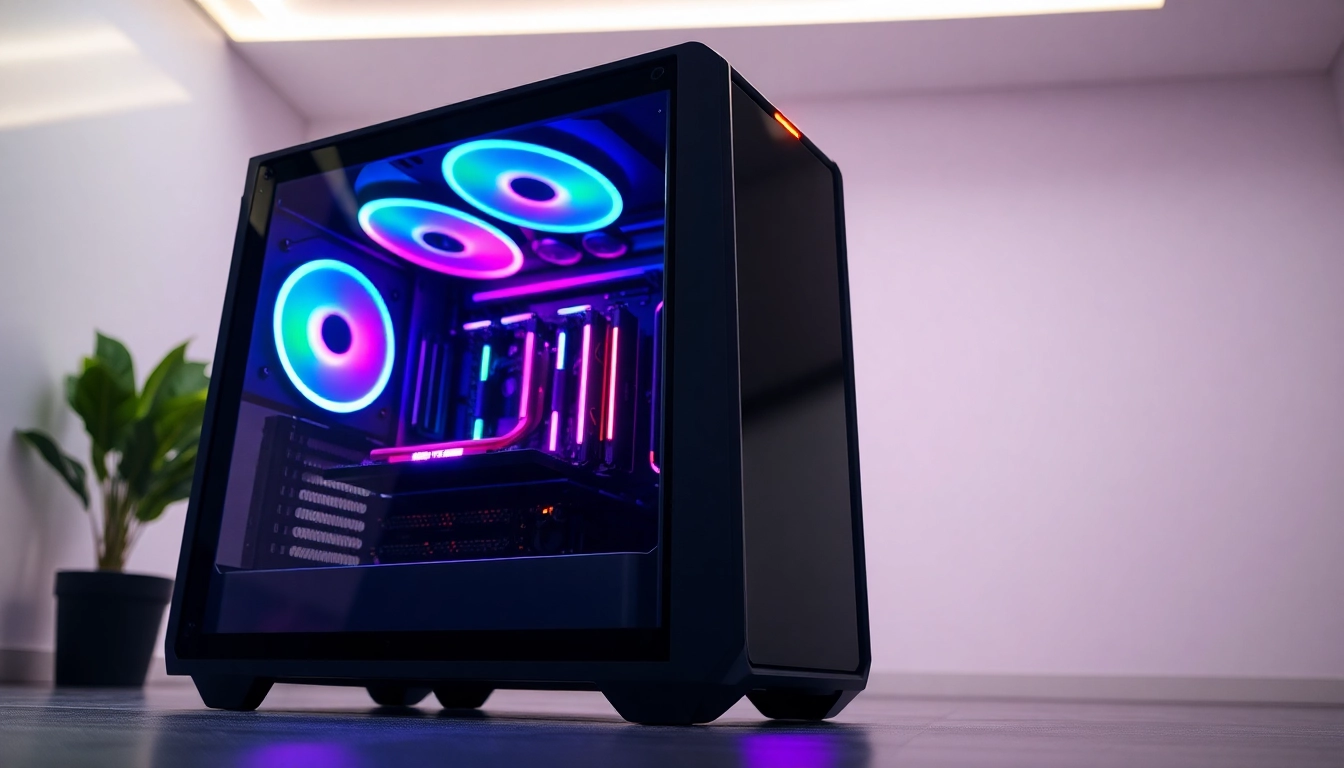Understanding PC CASE Manufacturers
The landscape of PC case manufacturers is both varied and competitive, catering to a growing community of gamers, creators, and tech enthusiasts. Understanding what distinguishes a leading PC CASE Manufacturer requires an exploration of their attributes, innovations, and the preferences of their target audiences. A quality case not only safeguards the components within but also enhances the aesthetic and functional aspects of a personal computer setup.
What Defines a Leading PC CASE Manufacturer?
A leading manufacturer in the PC case industry embodies various characteristics that contribute to its reputation and success. Key elements include:
- Quality of Materials: The best manufacturers use durable materials that resist wear and tear while providing adequate thermal management. Common materials include steel, aluminum, and tempered glass, each contributing to the overall longevity and aesthetic appeal.
- Innovative Design: A standout brand is constantly pushing the boundaries of design. This can mean creating cases with excellent airflow, modular designs for ease of use, or even cases with RGB lighting to cater to gamer aesthetics.
- Factory Specifications and Features: Manufacturers differentiate themselves through unique features such as removable dust filters, cable management solutions, and support for varying motherboard sizes and GPU lengths.
- Customer Support and Warranty: Trustworthy manufacturers often provide comprehensive customer support, ensuring users have access to assistance, spare parts, or replacements if issues arise.
Key Features of High-Quality PC Cases
When selecting a PC case, certain features become pivotal for user satisfaction and performance:
- Cooling Solutions: Adequate cooling is paramount for system stability. Manufacturers are now integrating advanced cooling mechanisms, including mesh panels for airflow, space for multiple fans, and even support for liquid cooling systems.
- Modular Design: A well-structured interior with modular features allows for easy upgrades and customizations, catering to users who may wish to modify their setups over time.
- Noise Dampening: High-quality cases often come with sound-dampening materials to minimize acoustic output from fans and components, enhancing the user experience.
- Aesthetic Customization Options: Customization allows users to express their style through interchangeable panels, LED lighting, and varied color options.
Industry Trends in PC Case Manufacturing
The PC case manufacturing industry is evolving, reflecting technological advancements and changing user needs:
- Minimalist Designs: There’s a growing trend towards minimalistic aesthetic designs, offering sleek lines and subtle finishes that complement modern workspace themes.
- Increased Emphasis on Sustainability: Manufacturers are focusing on sustainable materials and practices, responding to a consumer base that is increasingly environmentally conscious.
- Custom Builders on the Rise: The rise of custom PC builders is leading to a demand for unique, personalized case designs that cater to individual preferences.
- Integration of Smart Features: Some newer models are exploring the integration of smart features, such as temperature monitoring systems and remote cooling options, appealing to the tech-savvy crowd.
Popular Types of PC Cases on the Market
The choice of PC case significantly impacts not just aesthetics but also functionality and performance. Various forms and types exist to meet the specific needs of users:
Full Tower vs. Mid Tower: Which is Right for You?
Understanding the differences between full tower and mid tower cases is essential for any build:
- Full Tower: Generally, full towers offer ample space for motherboards, GPUs, and storage devices, making them ideal for gamers and professionals looking for maximum expandability. They can accommodate large cooling systems and multiple GPUs, catering to need for high-performance setups.
- Mid Tower: These cases often strike a balance between size and space, providing enough room for standard setups while being more compact than full towers. They are suitable for users with moderate requirements who prioritize a neat appearance and efficient use of desk space.
Compact Cases for Space-Saving Solutions
For users with limited space, compact cases are becoming increasingly popular:
- Mini-ITX Cases: Designed for ultra-compact builds, Mini-ITX cases house smaller motherboards and components while still allowing for adequate airflow. They are ideal for small offices, dorm rooms, or minimalist setups.
- Cube Cases: Offering a unique form factor, cube cases provide innovative cooling solutions while maintaining a compact size, catering to those who value both aesthetics and performance.
Custom PC Cases: Personalization and Functionality
Custom PC cases allow users to create builds that truly reflect their style and functional requirements:
- Fully Customized Designs: Some manufacturers offer bespoke cases tailored to specific needs, granting users complete freedom over design, material, and functionality.
- Aesthetic Customizations: Options like custom paint jobs, panels with artwork, and unique internal layouts allow users to transform their cases into statement pieces.
Choosing the Best PC CASE Manufacturer for Your Needs
With the myriad of options available, selecting the right PC case manufacturer is crucial for ensuring compatibility and satisfaction with your build. Here’s what to consider:
Evaluating Specs: What to Look For?
When assessing potential cases, focus on attributes that will impact your build’s performance and functionality:
- Dimensions and Compatibility: Ensure the case supports the components you plan to use, including motherboard size, GPU length, and cooling systems.
- Expansion Slots: Evaluate the number and type of expansion slots available to accommodate future upgrades.
- Cooling Support: Consider the case’s fan and radiator mounting options, ensuring they can support your desired cooling setup.
Brand Reputation and Customer Feedback
Evaluating a manufacturer’s reputation can provide insights into reliability and customer satisfaction:
- User Reviews: Review platforms and forums often provide a wealth of user experiences, shedding light on any potential issues or common praises.
- Industry Reputation: Long-established brands with a history of quality are often a safer bet, though newer companies may offer innovative features that appeal to modern needs.
Price Range: Budget vs. Premium Options
Budget considerations are essential when selecting a PC case:
- Budget Cases: Affordable options can still deliver adequate performance and features for casual use, though they may lack some premium aesthetics and materials.
- Premium Cases: Higher-end cases may feature superior materials, additional features, and improved aesthetics, catering to enthusiasts and those seeking performance at a cost.
Installation Tips for Your New PC Case
Proper deployment of your new PC case sets the foundation for a successful build. The following tips can ease the installation process:
Essential Tools for DIY PC Building
Preparing the right tools can make for a seamless build process:
- Screwdrivers: A Phillips head screwdriver is necessary, while a magnetic tip can be beneficial for retaining small screws.
- Anti-static Wrist Strap: To prevent static discharge that could damage components, use an anti-static strap while handling sensitive parts.
- Cable Ties: For efficient cable management, have zip ties or Velcro straps on hand to keep cables tidy and organized.
Common Challenges and Solutions
Even seasoned builders can face challenges during assembly:
- Insufficient Space: If components seem not to fit, re-evaluate the layout and consider removing unnecessary mounting brackets.
- Incorrect Orientation: Double-check the orientation of your motherboard and cooling systems, as incorrect placement can lead to overheating or malfunction.
Optimizing Cable Management for Aesthetic Appeal
Neat cable management doesn’t just improve airflow; it also enhances the visual appeal of your build:
- Routing Cables: Use designated cable management holes and channels to keep cables out of sight, ensuring a clean and professional appearance.
- Using Extensions: Consider colored or sleeved cable extensions for a personalized aesthetic, particularly for builds featuring transparent panels.
Future of PC CASE Manufacturing
The future of PC case manufacturing is poised for significant advancements driven by technological innovation and evolving consumer expectations:
Emerging Technologies in PC Case Design
Manufacturers are exploring cutting-edge technologies that could revolutionize the PC case industry:
- Smart Technology Integration: Incorporation of IoT features may allow users to monitor performance metrics such as temperature and airflow directly from mobile devices.
- 3D Printing Potential: Advancements in 3D printing could enable highly customized designs, allowing users to create bespoke cases tailored to their unique specifications.
Sustainability in Manufacturing Practices
As awareness of sustainability grows, manufacturers are beginning to shift towards eco-friendly practices:
- Recyclable Materials: More companies are investing in recyclable materials while minimizing waste during the production process.
- Energy-Efficient Manufacturing: Enhancements in energy efficiency during production can drastically reduce the carbon footprint associated with manufacturing operations.
Predictions for the Gaming and Tech Industries
As gaming becomes increasingly mainstream, the PC case industry will continue evolving to meet the needs of a diverse audience:
- Rise of eSports and Competitive Gaming: The demand for high-performance, aesthetically appealing cases will grow, creating opportunities for brands focusing on performance innovations.
- Integration with Converged Technologies: As more users engage in activities like streaming and content creation, manufacturers may start including features within cases that cater to multi-use functionalities.



